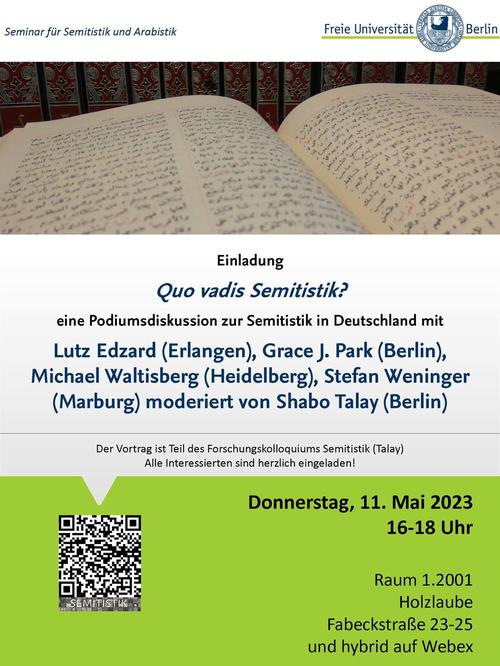Lectures 2023
29.06.2023
Vortrag im Rahmen des Semitistischen Forschungskolloquiums mit dem Titel "Moroccan Judeo-Arabic: diachrony and contact"
JONAS SIBONY (Paris): Moroccan Arabic verbs in Peripheral Israeli Hebrew.
FELIPE FRANCISCO (Berlin): Vernacular archaisms of Moroccan Arabic in a letter by Yahuda Ben Zamirro (16th century).
30.06.2023
“Aktuelle Entwicklungen im Bereich des Hinweisgeber:innen-Schutzes in der Wissenschaft” mit Dr. Hjördis Czesnick (Leiterin der Geschäftsstelle des Gremiums "Ombudsman für die Wissenschaft")Das OBUA-Projekt lädt herzlich zum Vortrag “Aktuelle Entwicklungen im Bereich des Hinweisgeber:innen-Schutzes in der Wissenschaft” ein!
Dr. Hjördis Czesnick, Leiterin der Geschäftsstelle des Gremiums "Ombudsman für die Wissenschaft" wird in ihrem Vortrag auf aktuelle Entwicklungen im Bereich des Hinweisgeber:innen-Schutzes eingehen. In wissenschaftlichen Einrichtungen sind schon lange Ombudspersonen eingesetzt, an die sich Hinweisgebende mit Beobachtungen möglicher GWP-Verstöße wenden können. Zeitnah wird nun ein neues Hinweisgeberschutzgesetz in Deutschland implementiert, um die EU-Richtlinie "Protection for whistleblowers" zu implementieren. Es wird besprochen, welche Auswirkungen dies auf das Whistleblowing in der Wissenschaft haben wird. Der Vortrag geht auf die Verantwortung und mögliche Maßnahmen wissenschaftlicher Einrichtungen im Bereich des Schutzes von Hinweisgeber:innen ein und zeigt aktuelle internationale Entwicklungen im Bereich der guten wissenschaftlichen Praxis, etwa im European Network of Research Integrity Offices (ENRIO), auf.
01.03.2023
“The potential impact of AI generated texts on good scientific practice and Ombuds work” with Dr. Glatzmeier (FU Berlin)The OBUA project cordially invites you to our first Lunch Talk on “The potential impact of AI generated texts on good scientific practice and Ombuds work” with Dr. Armin Glatzmeier (FU Berlin)!
In a brief lunch talk, Dr. Glatzmeier will introduce the functions of ChatGPT and report on the current state of the debate around its applicability and potential misuse in academic contexts. Afterwards, you will have the opportunity to discuss your own questions, and maybe already experiences, with us.
The event will take place in English via Webex on Wednesday, March 1, 12-1pm (s.t.).
Short abstract
The recent debate around research integrity and AI generated texts since the release of ChatGPT has potential repercussions on issues of good scientific practice in general and Ombuds work in particular, especially in the area of authorship and questionable research practices.
Dr. Armin Glatzmeier is part of the Teaching Library team at Freie Universität Berlin and is involved in the implementation and further development of courses to promote writing skills and fostering good scientific practice.
30.03.2023
“Are questionable research practices a ‘basic condition’ when doing research? ” with Prof. Jesper W. Schneider (Aarhus University)The OBUA project cordially invites you to a talk on “Are questionable research practices a ‘basic condition’ when doing research?” with Prof. Jesper W. Schneider (Aarhus University)!
Short abstract
The talk will discuss perceptions of questionable research practices and problematize the way in which we have tried to measure their prevalence. It scrutinizes popular perceptions and questions the usefulness of striving to have a category of practices labeled as questionable, providing examples from a recent large-scale study where some of the issues are addressed.
Prof. Schneider works as a meta-researcher at the Danish Center for Studies in Research and Research Policy, focusing, amongst other things, on questionable research practices and the perception of research quality. He is currently a visiting fellow at the Objective 3: Advancing Research Quality and Value of the Berlin University Alliance.
11.05.2023
Quo vadis Semitistik? Eine Podiumsdiskussion zur Semitistik in Deutschland mit Lutz Edzard (Erlangen), Grace J. Park (Berlin), Michael Waltisberg (Heidelberg), Stefan Weninger (Marburg) moderiert von Shabo Talay (Berlin)Diese Veranstaltung ist Teil des von Prof. Shabo Talay organisierten Semitistischen Forschungskolloquiums 2023.




